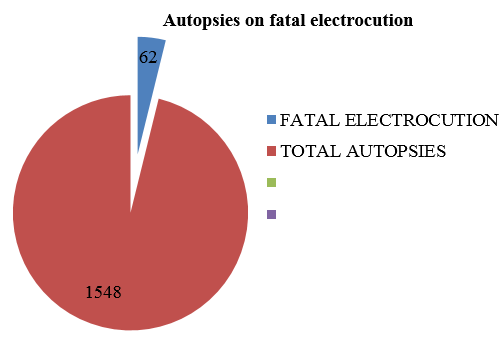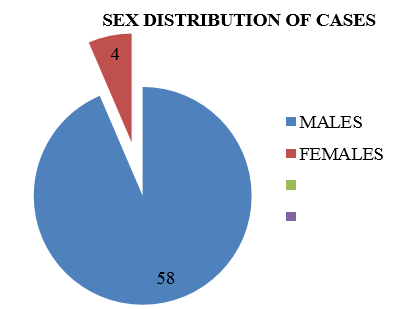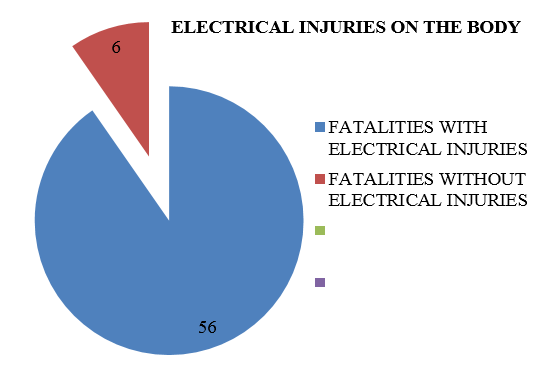- Visibility 448 Views
- Downloads 38 Downloads
- DOI 10.18231/j.ijfmts.2022.013
-
CrossMark
- Citation
An autopsy study of fatal electrocution
- Author Details:
-
Dinesh Rao *
Introduction
Electrical Fatality Is not Uncommon, and They Pose a Serious challenge to the forensic Pathologist. Though Improvements in the Safety Measures and Quality of Electrical installations, the Fatality both at the Work Place and House are not Uncommon.[1], [2], [3] In the recent Time Fatality due to Electricity has Drastically reduced though Not Complete. Electric Fatalities are commonly found both at the Workplace and the House. Low-voltage current (from 60 to 1000 V, usually 220 or 360 V) usually found in the Household Supply whereas, high-voltage (more than 1000 V) current, lightning, and voltaic arc are commonly found in the Commercial and Public Transit Supply. Human body conducts electricity and if any part of the body comes into contact with any unprotected electrical source, the electricity will flow through the Tissues with little Obstruction often leading to Fatality. The Commonest Signs in Electric Fatalities is the presence of Contact Injury and the Exit injuries, but there are circumstance showing these injuries are absent, however based on the circumstances and Exclusion of other possible cause of death Electrocution Deaths are Confirmed. The severity of the electric injuries and its diversity in appearance, also depends on the amount of electric current and type of electric current. Accidental electrocution forms majority of fatalities however suicidal and homicidal electrocution possibility should also be considered. There are instances where Secondary Injuries are present in Electric Fatalities. Hence, it is always essential to understand the Electrical Fatalities in Totality by analyzing Its Injuries, Internal Damage and Cause of Death. The present study is one such attempt to understand the electrical injuries in fatal electrocution.
Materials and Methods
This Prospective Study was carried out during the period 2013 to 2021. All cases were referred for the Forensic Autopsy from the Local Police Station. The Study was carried out in SSIMS, Bangalore and TOMCH & RC, Bangalore. All details of the Cases entered in the Autopsy Report were Examined and Data thus Collected were Analyzed at the end of the Study. Information furnished from the Police were also considered for Corroboration.
Aims & Objectives
To study the contact & exit injuries in fatal electrocution.
To study the age & sex differences in fatal electrocution.
To study the manner of death in fatal electrocution.
Results




|
S.No |
Place |
Total Cases |
|
01 |
House |
38 |
|
02 |
School |
02 |
|
03 |
Hostel |
02 |
|
04 |
Hospital |
01 |
|
05 |
Miscellaneous |
06 |
|
|
Total |
49 |
|
S.No. |
Place |
Total Cases |
|
01 |
Factory |
02 |
|
02 |
Farm |
02 |
|
03 |
Electric Pole/Transformer |
09 |
|
S.No. |
Pathological Changes in Organs |
Total number |
|
01 |
Petechial Haemorrhages in the Cardia |
42 |
|
02 |
Pulmonary Haemorrhages |
16 |
|
03 |
Myocardial Necrosis |
32 |
|
04 |
Burns/Charring |
18 |
|
S.No. |
Age Group |
Total No |
|
01 |
0-10 |
01 |
|
02 |
11-20 |
14 |
|
03 |
21-30 |
31 |
|
04 |
31-40 |
12 |
|
05 |
41-50 |
04 |
|
06 |
51-60 |
00 |
|
07 |
61-70 |
00 |
|
S.No. |
Site |
Contact |
Exit |
Total No |
|
01 |
Right Hand |
Yes |
No |
32 |
|
02 |
Left Hand |
Yes |
No |
10 |
|
03 |
Right Arm |
Yes |
No |
04 |
|
04 |
Forehead/Head |
Yes |
No |
08 |
|
05 |
Chest Wall |
Yes |
No |
02 |
|
06 |
Right Foot |
N0 |
Yes |
42 |
|
07 |
Left Foot |
No |
Yes |
12 |
|
08 |
Chest Wall |
No |
Yes |
02 |
|
09 |
Nil |
No |
No |
06 |
Discussion
The Present prospective Study was carried out during the period 2013 to 2021, a total of 62 Electric Fatalities[4%][Fig 01] cases were Autopsied during the Period, these results are in contrast to those observations made in similar studied done by Gupta et al, [4] Rautji et al [5] and Gururaj et al [6] wherein Electric Fatalities contributed to 2.02%,1.98% & 1.14% respectively. This increase in number of deaths in the present studies is due to Prolonged period of Study [Ten Years] unlike other studies wherein their period of study ranged from 3years-5years. The Other possibility is Urban Factors, Increased Population, Industrial sectors which were major contributors to the Fatalities in the Present study unlike other Similar studies.
In the present study Major number of Victims were Males, 93.5%[n-58] and Females contributed to mere 6.5%[n-4][[Figure 2]] of the cases, an observations similar to those made by Gururaj et al [4] and others,[7], [8], [9] however in a study made by Ivana K et al [10] the Number of Female Victims were 12% of the fatalities, This indicates the Male Dominated Work place at all sectors.
The Major Group affected in the present study were between 21-40 years, 50%[n-31][[Table 4]] of Fatalities, followed by those belonging to 2nd and 4th Decade contributing to 22.5% and 19.4% respectively. These observations are close to those made by others.[4], [5], [6], [11], [12], [13] This increase in Fatalities involving Victims of 2nd and 3rd Decade clearly indicates the Active Age group and Mobility, involved in the Working Class.
In the present Study Majority of the Electrocution Fatalities were Accidental, 96.8%[n-60][[Figure 3]] and Homicidal Electrocution deaths contributed to only 3.2&[n-2] cases and No Suicidal Electrical Fatalities were reported during the period of study, this is similar to the observations made elsewhere.[4], [5], [6]
In a study conducted by Sheikazadi et al [14] & Kuhtic et al [15] Ten cases & 14% of Fatalities were Suicidal Electric Fatalities, which is contrary to the observations made in the present study wherein no Suicidal Electrical Fatalities were reported. This area needs to be closely analyzed as why in his study the choice of the Suidee was Electric Source, Regional Factor or Socio economic Factors cannot be ruled out.
However, the present study is unique in its observations wherein Two cases of Homicidal Electrical Fatalities were reported during the period of Study, in all the Two cases the Victim were Incapacitated by Alcohol and Restrained at the Wrist and Legs, and then the Victims were connected to the Source, as a mode of Killing. These observations had alerted the Investigators the Possibility of Homicides involving Electrical Current.
In the present case Low Voltage Electric Fatalities contributed to 79%[n-49][[Table 1]], this was close to the observations made by Kuhtic et al [15] wherein Low Voltage Electric current contributed to 75% of Fatalities. The major Fatalities with Low Voltage were recorded in House in 61.3%[n-38] of cases similar were the observations made by Kuhtic et al.[15]
In the present Study high Voltage Electrical Fatalities [[Table 2]] contributed to only 21%[n-13] of the cases.
In the present Study the Major Site of Contact to Electric Source was Right Hand in 51.7%[n-32] cases followed by Left hand in 16.1%[n-10][[Table 5]] of cases, this is due to the possibility of the Usage of right-handed at the work or Occupation, these observations were similar to those made by other researchers. [16], [17], [18] However Right Foot showed the maximum Site for Exit of the Electric Current in 67.7%[n-42] of cases and Head also contributed to Contact source in 12.9%[n-08] of the fatalities. All this indicates that Work at tor around the source of Electrical current without adequate Protective Gears may expose the Body parts to the Source either by touch or Contact, that result i Fatalities. High Voltage Electric Current fatalities always showed gaping contact wounds and Burns involving major part of the body. [16], [17], [18], [19]
In the present Study the pathological Changes involving the heart showed Hemorrhages and Necrosis of the Muscles in 67.7% and 51.6% [[Table 3]] respectively. This indicates that Major route of Transmission is through the Heart.
In 9.7%[n-06][[Figure 4]] of Fatalities Contact or Exit Sites could not be Located or Identified, however in a study conducted by Kuhitic et al [15] 50% of his Victims did not showed Contact or Exit Wounds in the Victims, Majority of the victims were either found in the Water Tank, Rain and in Batch Tub.
Hence, In all Death Investigation Involving Electric Current it is essential to Examine the Crime Scene to understand the Circumstances, besides the Type of Electric Current is essential to understand the injuries on the body. Hence, Electric Fatalities always pose a Challenge to the investigators to understand the use of Death and also Manner of Death.
Ethical Clearance
The Ethical Clearance was taken from Institutional Ethical Committee, and they had cleared with a comment that it was Postmortem Study and No Clinical Trials was attempted.
Conflicts of Interest
The authors have no conflict of interest to declare.
Source of Funding
None.
References
- SR Mashreky, A Rahman, TF Khan, L Svanstrom, F Rahman. Epidemiology of Childhood electrocution in Bangladesh: findings of national survey. Burns 2010. [Google Scholar] [Crossref]
- . Accidental deaths and Suicides in India 2011. National Crime Records Bureau. Ministry of Home Affairs. Available at http://ncrb.nic.in/CD-ADSI2011/ADSI-2011%20REPORT.pdf. Accessed on 24 June 2014. . [Google Scholar]
- KK Shaha, AE Joe. Electrocution-related mortality: A retrospective review of 118 deaths in Coimbatore. Med Sci Law 2002. [Google Scholar]
- BD Gupta, RA Mehta, MM Trangadia. Profile of deaths due to electrocution: a retrospective study. J Indian Acad Forensic Med 2012. [Google Scholar]
- R Rautji, A Rudra, C Behara, TD Dogra. Electrocution in South Delhi; A retrospective study. Med Sci Law 2003. [Google Scholar]
- B Gururaj, C K Shetty, S Babu, V Yogiraj, P Shetty. Profile of Fatal Electrocution cases in Ballari. Int J Med Toxicol Forensic Med 2017. [Google Scholar]
- D M Fatovich. Electrocution in Western Australia, 1976-1990. Med J Aust 1992. [Google Scholar] [Crossref]
- J Lucas. Electrical fatalities in Northern Ireland. Ulster Med J 2009. [Google Scholar]
- A Sheikhazadi, M Kiani, M H Ghadyani. Electrocution-related mortality: a survey of 295 deaths in Tehran, Iran between. Am J Forensic Med Pathol 2002. [Google Scholar]
- I Kuhtic, M Bakovic, D Mayer, D Strinovic. Electrical Mark in Electrocution Deaths - A 20-Years Study. Open Forensic Sci J 2012. [Google Scholar]
- M Shrigiriwar, R Bardale, P G Dixit. Electrocution: a six year study of electrical fatalities. J Indian Acad Forensic Med 2007. [Google Scholar]
- W Dokov. Forensic characteristics of suicide by electrocution in Bulgaria. J Forensic Sci 2009. [Google Scholar]
- K B Laupland, J B Kortbeek, C Findlay, A W Kirkpatrick, S M Hameed. Population based study of severe trauma due to electrocution in the Calgary Health Region. Canadian J Surg 1996. [Google Scholar]
- A Sheikhazadi, M Kiani, M H Ghadyani. Electrocutionrelated mortality: A survey of 295 deaths in Tehran. Am J Forensic Med Pathol 2006. [Google Scholar]
- I Kuhtic, M Bakovic, D Mayer, D Strinovic, V Petrovecki. Electrical mark in electrocution deaths - 1 20-years study. Open Forensic Sci J 2012. [Google Scholar] [Crossref]
- B Karger, O Suggeler, B Brinkmann. Electrocution-autopsy study with emphasis on electrical petechiae. Forensic Sci Int 2002. [Google Scholar] [Crossref]
- Y Tirasci, S Goren, M Subasi, F Gruken. Electrocution related mortality: a review of 123 deaths in Diyarbakir, Turkey between 1996 and 2002. Tohoku J Exp Med 2006. [Google Scholar] [Crossref]
- RW Byard, KA Hanson, JD Gilbert, RA James, J Nadeau, B Blackbourne. Death due to electrocution in childhood and early adolescence. J Paediatr Child Health 2003. [Google Scholar] [Crossref]
- R K Wright. Death or injury caused by electrocution. Clin Lab Med 1983. [Google Scholar]
How to Cite This Article
Vancouver
Rao D. An autopsy study of fatal electrocution [Internet]. IP Int J Forensic Med Toxicol Sci. 2025 [cited 2025 Sep 09];7(2):56-59. Available from: https://doi.org/10.18231/j.ijfmts.2022.013
APA
Rao, D. (2025). An autopsy study of fatal electrocution. IP Int J Forensic Med Toxicol Sci, 7(2), 56-59. https://doi.org/10.18231/j.ijfmts.2022.013
MLA
Rao, Dinesh. "An autopsy study of fatal electrocution." IP Int J Forensic Med Toxicol Sci, vol. 7, no. 2, 2025, pp. 56-59. https://doi.org/10.18231/j.ijfmts.2022.013
Chicago
Rao, D.. "An autopsy study of fatal electrocution." IP Int J Forensic Med Toxicol Sci 7, no. 2 (2025): 56-59. https://doi.org/10.18231/j.ijfmts.2022.013
